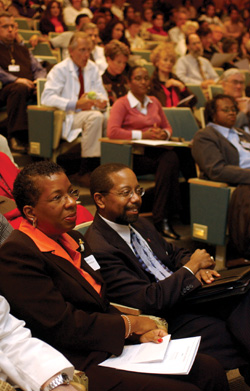
The Rev. Kenneth S. Robinson, M.D., Tennessee Commissioner of Health and a former member of the Vanderbilt faculty, spoke on “Faith, Medicine and Public Health” last week. His wife, the Rev. Marilynn S. Robinson, M.P.H., left, also a former Vanderbilt employee, introduced him./ Photo by Dana Johnson
State health commissioner speaks at Medical Center
Tennessee’s top health official last week praised Vanderbilt University Medical Center for transforming itself into “a place of hope and promise” committed to partnering with its community.
The Rev. Kenneth S. Robinson, M.D., Tennessee Commissioner of Health and a former member of the Vanderbilt faculty, spoke on “Faith, Medicine and Public Health” to a group of students, faculty, government officials and community leaders Dec. 10 in the Medical Center’s Light Hall.
Robinson credited Vanderbilt University Chancellor Gordon Gee’s vision for inspiring a “further transformation of Vanderbilt … where the driving mission today is responding to today’s and tomorrow’s health care needs in a warm and caring environment.”
That vision, he continued, is demonstrated by “this new spirit, this new outreach, this new focus on decreasing what at times has been seen as academic isolationism, with a pollyannaish pursuit of parochial priorities.”
Vanderbilt officials, in turn, said they were committed to increasing their involvement in the community. Examples include involvement by the Schools of Medicine and Nursing in community health clinics, and the Medical Center’s alliance with Meharry Medical College.
“We all know that Tennessee demonstrates some really poor overall public health statistics,” said Dr. Harry R. Jacobson, vice chancellor for Health Affairs, in introducing the lecture. “We’re committed to joining in a common purpose with the commissioner and the state to try to bring about real change.”
Robinson, pastor of a 1,200-member church in Memphis who was appointed state health commissioner by Gov. Phil Bredesen last February, said his vision is to transform the Tennessee Department of Health into one “which pragmatically and positively impacts the health and well-being of poor and underserved communities.”
In particular, he said, the department will focus on eliminating racial and ethnic health disparities, reducing the state’s teen pregnancy rate and addressing the problem of obesity.
“We are a fat state,” Robinson said. “We’re going to focus on diet and exercise, decreasing heart disease and cerebral vascular disease and diabetes mortality, because we’re fat and we’re not going to be fat any longer.
“I’m not a researcher,” he continued. “I’m a pragmatist, and I want to act … This is my life. This is my history. This is my calling.”
A native of Nashville, Robinson began working with children at the Clover Bottom Developmental Center when he was 13 years old, recalled his father, James M. Robinson, a retired Metro teacher and principal. That work led to his participation in the founding of the National Youth Association for Retarded Children, for which he received national recognition, his father said.
Robinson was valedictorian of his senior class at Pearl High School in 1971, and went on to Harvard, where he earned his bachelor’s and medical degrees. In 1982, Robinson returned to Nashville with his wife, the Rev. Marilynn S. Robinson, M.P.H., and their twin daughters.
Marilynn Robinson served as assistant administrator of Vanderbilt University Hospital while her husband pursued a Master of Divinity degree from Vanderbilt Divinity School, taught on the internal medicine faculty at the Medical School, and was pastor of a church.
In 1991, Robinson was named pastor of the St. Andrew AME Church in Memphis. He established community programs to serve at-risk youth and adults, and, as assistant dean for admissions and student affairs at the University of Tennessee College of Medicine, helped triple African-American enrollment.
Robinson has won several honors for his efforts, including a Robert Wood Johnson Foundation Community Health Leadership Award in 1998, and a Community Builder Award by the United Way of America in 2000.













